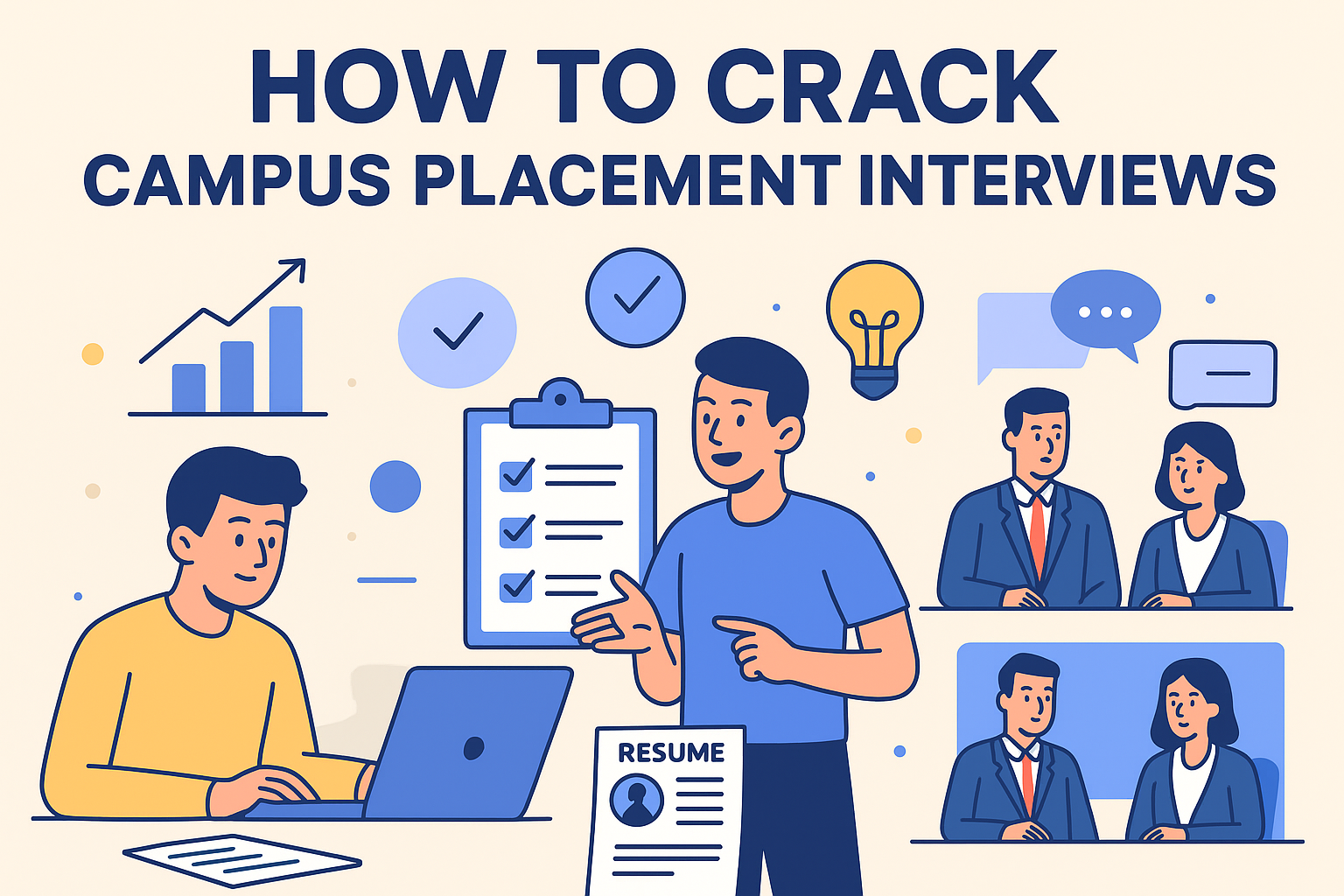The successful completion of your academy life is the start of the new interesting phase: Placement season India. From getting one offer letter to launching your career, your daily life revolves around for a few months. It’s a great idea to secure your future through Indian Campus recruitment.
So the question is here: How can you manage yourself to be hired by the top companies? This guide provides actionable placement preparation tips, the core Criteria for campus placement—covering everything from foundational technical expertise to mastering the final handshake—ensuring you’re fully equipped for campus placements 2025.
Section 1: Laying the Groundwork – The Pre-Placement Strategy
Don’t wait for your final semester to be completed. Rather start from the first semester onwards to make your journey successful and inspiring.
The Two Pillars of Technical Readiness
For students targeting core tech roles, particularly those asking How to prepare for campus placement CSE or How to prepare for campus placements Engineering, technical mastery is non-negotiable.
1. Data Structures and Algorithms (DSA): This is the ultimate gatekeeper for product-based companies. Your ability to solve complex problems efficiently, not just write basic code, is what employers seek. Focused DSA preparation for placement should be an ongoing effort. Even if you're asking How to prepare for placement CSE in 2 months, dedicate daily, rigorous time to standard DSA problems on a specialized Placement training website.
2. Core Subject Foundation: Regardless of your specialization, a solid understanding of your core subjects—whether it’s DBMS, OS, OOPS (for tech) or Finance Fundamentals and Taxation (for commerce)—is crucial. These are the Technical skills required for placement. Interviewers often revert to fundamentals when advanced problem-solving stalls.
Resume Building for Placements
To appear for the interview, building an effective resume is the prerequisite. It must be neat, simple and concise, and should give an idea of your projects highlighting the technical skills applied. Some tips must be followed before building an effective resume:
1. Action Over Description: Mention the internships and the technical work, projects illustrating your technical skills implemented and any certification accomplished.
2. LinkedIn and GitHub: Add your LinkedIn profile to show your interest and network, and GitHub profile as a proof of your projects and code saved.
3. Mention your technical and soft skills, use action verbs as “developed”, “implemented” and “analysed” etc.
To build your resume for off-campus placements and on-campus placements, use free tools like Canva. To get some effective and efficient ideas for creating an ATS-Friendly Resume, click it.
Section 2: Conquering the Selection Process Stages
Generally Indian campus recruitment drives emphasize simple 3 step funnel. To crack it, you need to create a strategy for each step.
1. The Written Assessment: Speed and Accuracy
The first step is commonly an online test pivoting quantitative aptitude and logical reasoning, verbal ability. The simple strategy is practice as much as you can. Constantly visiting Placement training websites to solve mock tests on or before specified time. To meet the Criteria for campus placement of various companies and cross the minimum cut-off mark, continuous aptitude test is the only key.
2. The Technical Showdown
This step focuses on your depth of knowledge and problem solving ability.
a. Project Explanation: Be prepared to highlight the deep knowledge of your technical skills on your projects mentioned in the resume, the challenges faced, the analysis done to resolve it.
b. The Coding Round: Here the interviewer will test your analysis on the coding, how you think, make a strategy on a scenario to get the solution, and the coding standard.
c. Behavioral Questions: Here the Interviewers are very keen to know how rapidly you adapt to a team, make a scenario based solution to any conflict, and how quickly apply your skills.
3. The Personality Check
The final step is always a HR round. The HR team assesses your communication skills, positive attitude and dedication.
a. Must be well prepared for some frequently asked HR interview questions like “tell me about yourself”, “Why should we hire you”, “Why do you think you are fit for this role”
b. Professionalism, positive frame of mind, and attitude are to be followed during the HR interview. To reflect the campus hiring trends, candidates must be team players and sustain in dynamic work cultures.
Section 3: The Edge – Beyond the Classroom
Landing your dream job requires going the extra mile. Here are final placement preparation tips to gain a significant advantage.
Mock Interviews and Feedback
To make flawless campus interview strategies, engage in mock interviews campus or external portals with your colleagues, seniors and experts to get most valuable feedback from the session to outline your weakness. Further you can make solutions to those areas to overcome the challenges met during the hiring hours.
Utilizing All Resources
a. Job Fair Preparation: Always participate in the job fair preparation event conducted by colleges. For real hiring, candidates must research company profiles before appearing in the interview.
b. Placement Preparation Course: Enroll for a Placement preparation course online/offline. You can focus on DSA preparation for placement by their well structured courses. If it's any aptitude course, it may help you in finding shortcuts and tricks for a solution.
The Power of Soft Skills
For better growth in your career, you should not only focus on the technical skills, but also focus on soft skills.
a. Communication: The key to crack campus placements, focus on participating in debate, reading the newspaper, watching TedTalks, and practicing mock GDs.
b. Adaptability: To be on the top of campus hiring trends, put your enthusiasm to upskilling and reskilling, focus on creative ideas, and be a team player.
Frequently Asked Questions (FAQs)
1. What is the key to crack the campus placements?
Ans. Continuous preparation and making effective strategy is the key to crack the campus placements. So you can master the Technical skills required for placements(especially DSA for IT roles), strong problem-solving capabilities, and effective communication.
2. How should I prepare for the campus placements?
Ans. Need to follow a structured plan for campus placement:
a. Devote your time to DSA preparation for placement.
b. Focus on aptitude and reasoning by visiting a Placement training website.
c. Add your technical skills, projects, internships and certifications in your resume.
d. Attend Mock interview campus to get confidence during interview and make a strategy to HR interview questions.
3. How to improve my communication skills?
Ans. Participating in GDs, reading newspapers loudly, Watching various TedTalks, Record your voice to analyze your weak areas and work on improvements, attending English debates are the foremost actions to enhance effective communications.
4. What are the key Technical skills required for placement in a typical IT company?
Ans. For an IT job profile, prioritize coding(Java, Python), problem solving ability, knowledge on database, system management etc.
5. Can I crack placements if I start preparing for placement CSE in 2 months?
Ans. To crack CSE in 2 months, you need to devote 80% of your time in DSA topics, aptitude test preparation, and revise key topics of CS so that you can meet the Criteria for campus placement.
6. What is the role of the Placement cell India in the recruitment process?
Ans. The placement cell India is the bridge between students and companies, sets up the guidelines for Indian campus recruitment, enforcing the Criteria for campus placements, organises events like job fair preparation, shares college placement tips.
7. What is the difference between campus placements and off-campus placements?
Ans. Campus placements focus on technical skills, aptitude and reasoning, effective communication. If missed or not selected in off campus placements, you need to prepare yourself for on campus placement. For that, build an effective resume and upload in portals like Naukri.com, LinkedIn.com, and Indeed. Attend walk-in and virtual interviews organised by company associates.

